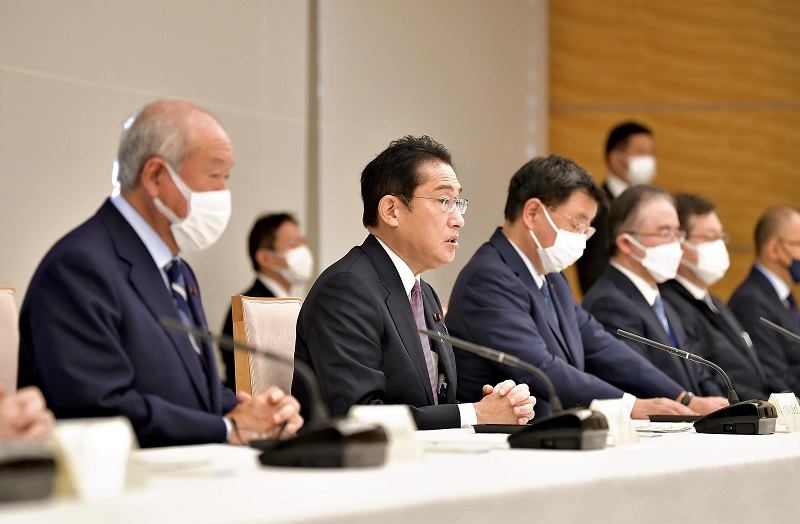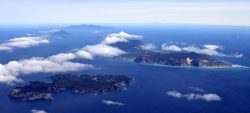Cabinet approves 3 key security documents with focus on counterstrike capabilities

Prime Minister Fumio Kishida, second from left, speaks at a ministerial meeting on strengthening the Japan Coast Guard’s capabilities at the Prime Minister’s Office in Tokyo on Friday.
17:31 JST, December 16, 2022
The government approved three key security documents, which will guide the nation’s foreign and defense policies for the next 10 years, at a Cabinet meeting on Friday.
The main pillar of the documents, including the National Security Strategy, specifies the possession of counterstrike capabilities to destroy enemy missile launch sites and other military targets for self-defense, marking a major shift in the nation’s postwar security policy.
Previously, the government only referred to counterstrike capabilities as being within the scope of self-defense but never took the step of specifying the possession of such capabilities as part of its policy.
However, as countries such as China and North Korea have advanced their development of hypersonic weapons and other missiles that are difficult to intercept, the Japanese government has decided to allow the nation to possess counterstrike capabilities from the perspective of enhancing deterrence.
The government regards China, which has increasingly made hegemonic moves, as “the greatest strategic challenge” that Japan has ever faced. The government includes in its security policy the introduction of “active cyber defense” to prevent major cyber-attacks as well as the establishment of a new government organization that will play a central role in implementing cyber defense measures.
The government intends to secure about ¥43 trillion in defense spending for the five years from fiscal 2023. Together with security-related expenditures, including funding for defense-related research and development by ministries and agencies other than the Defense Ministry, the aim is for total defense spending in fiscal 2027 to account for 2% of the nation’s current gross domestic product.
Prime Minister Fumio Kishida held a press conference at the Prime Minister’s Office on Friday evening and said: “We have conducted realistic simulations to see if the current Self-Defense Forces can deter threats based on various contingencies, predicated on the capabilities of our opponents and new ways of fighting. Frankly speaking, the current [defense capabilities] are insufficient,” seeking understanding for the possession of “counterattack capabilities.”
Stronger coast guard
On Friday morning, the government decided on a policy on strengthening the capabilities of the Japan Coast Guard during a meeting of relevant ministers.
The policy calls for bolstering the JCG’s capabilities in six priority areas, such as territorial waters around the Senkaku Islands in Okinawa Prefecture. To this end, the government envisages increasing the JCG-related budget by about ¥100 billion from the current fiscal year’s initial budget, to reach about ¥320 billion in fiscal 2027.
At the meeting, Kishida stressed the need for a substantial increase in the JCG budget, saying, “The situation surrounding the waters around our country has grown tense, so it is necessary to strengthen the defense system further.”
Kishida also expressed his intention to reinforce the surveillance system by newly deploying four large patrol vessels and using drones that can be piloted remotely.
In the policy, the government emphasized the importance of the JCG’s role in security. Citing the territorial waters around the Senkaku Islands as an example, the policy stated the JCG has carried out its duties to prevent the tense situation from escalating and developing into armed conflict.
The government also included in the policy a plan to strengthen the patrol system around the Senkaku Islands by upgrading patrol vessels and other equipment. In recent years, Chinese Coast Guard patrol vessels have become larger and more armed, prompting Japan to enhance its response capabilities.
The government formulated such a document concerning the JCG for the first time since 2016. The government reviewed the JCG document in conjunction with the revision of the three key security documents.
Top Articles in Politics
-

Japan PM Takaichi’s Cabinet Resigns en Masse
-

Sanae Takaichi Elected Prime Minister of Japan; Keeps All Cabinet Appointees from Previous Term
-

Japan’s Govt to Submit Road Map for Growth Strategy in March, PM Takaichi to Announce in Upcoming Policy Speech
-

LDP Wins Historic Landslide Victory
-

LDP Wins Landslide Victory, Secures Single-party Majority; Ruling Coalition with JIP Poised to Secure Over 300 seats (UPDATE 1)
JN ACCESS RANKING
-

Producer Behind Pop Group XG Arrested for Cocaine Possession
-

Japan PM Takaichi’s Cabinet Resigns en Masse
-

Man Infected with Measles Reportedly Dined at Restaurant in Tokyo Station
-

Israeli Ambassador to Japan Speaks about Japan’s Role in the Reconstruction of Gaza
-

Videos Plagiarized, Reposted with False Subtitles Claiming ‘Ryukyu Belongs to China’; Anti-China False Information Also Posted in Japan


























